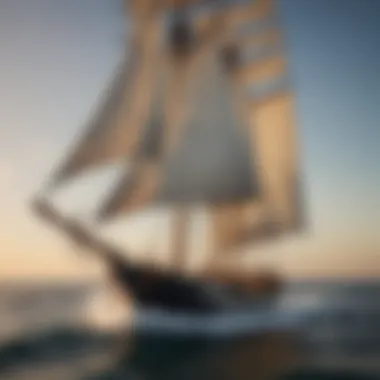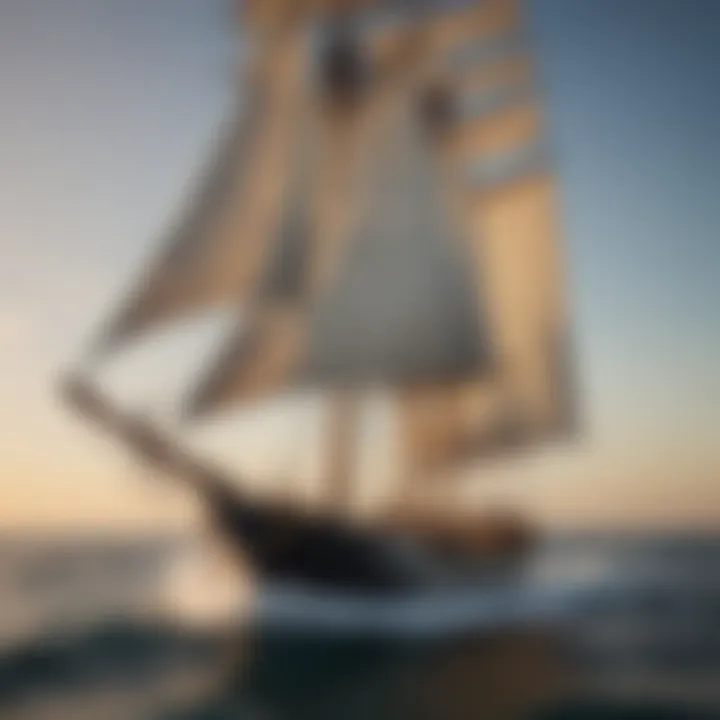Nautical Names for Boats: A Unique Exploration Guide


Intro
Choosing a name for a boat is akin to naming a child. It carries weight, meaning, and perhaps even a smattering of whimsy. In the vast realm of the ocean, a boat's name often holds deeper significance and can reveal much about its owner and the adventures that lie ahead. A name serves not merely as a label but as a beacon of identity, reflecting personal stories, aspirations, and connections to the sea. This exploration into nautical names offers a journey through historical references, personal anecdotes, and cultural heritage that shape the names we bestow upon our vessels.
In this guide, we will traverse through the art of naming boats, uncovering categories that range from the light-hearted to those that inspire awe. Our aim is to inspire both seasoned sailors and eager newcomers to this maritime world. As we journey together, consider what resonates with your soul — your connection to the ocean, the vessel you sail on, and the adventures that await you.
The Essence of Nautical Names
The essence behind nautical names is layered in tradition and influence. They often draw from the mythology of the sea, classic literature, or even personal experiences. Renowned vessels throughout history, from The Dawn Treader in C.S. Lewis's Chronicles to The Titanic, have names that evoke emotion and a sense of grandeur. Each name tells a story, often reflecting the character of the boat itself or the journey it will embark upon.
- Heritage: Many boat names are inspired by cultural mythology, weaving in tales of gods or spirits that once roamed the seas.
- Personal Connection: For some, a name may pay homage to a beloved family member, a cherished pet, or a lifelong dream.
- Whimsy and Humor: Others might choose names that spark joy or laughter, creating camaraderie among fellow sailors.
Choosing the right name, then, becomes not just an exercise in creativity but rather a thoughtful reflection of one's identity as a sailor. As we venture deeper into this guide, let’s explore the various categories that define the naming landscape.
Foreword to Nautical Naming Conventions
Selecting a name for a boat is more than just a whimsical act. It evokes a deep connection between the vessel and its owner, capturing memories, aspirations, and even a sense of identity. Nautical naming conventions have evolved, reflecting historical, cultural, and personal influences. Understanding these elements allows boat owners to forge a stronger bond with their vessels, while also standing out in a world where names create first impressions.
The Essence of a Boat's Name
A boat’s name can be seen as its persona on the waters. Just as names identify us and often carry stories, a boat’s name carries the weight of purpose and nostalgia. It's an anchor of sorts, grounding its owner in shared experiences and dreams. Here are some key aspects about why a boat's name matters:
- Identity: Much like a brand, a boat's name can tell potential spectators what kind of experience they might expect.
- Connection: A name can evoke sentimental memories, linking the owner to important life events or cherished individuals.
- Tradition: Many owners choose names rooted in maritime tradition, honoring the legacy of seafaring and the stories of their ancestors.
When considering a name, it should resonate on a personal level. Whatever name is chosen, it will be spoken aloud many times, seen on the water and heard in conversations.
Historical Context of Nautical Names
Nautical names have a rich historical tapestry woven from ancient sailing traditions. In maritime history, names often reflected the aspirations of the boat's owner or the characteristics of the vessel itself. For instance, a sturdy-looking boat might be named "Sea Wolf" to mirror strength and resilience.
Historically, sailors believed that a name could attract good fortune or ward off evil spirits. Even in contemporary settings, the consideration of luck persists in boat naming practices. This can be illustrated by:
- Mythology: Names inspired by gods or mythological figures, such as "Odyssey" or "Aphrodite", are common. They invoke a sense of adventure or protection.
- Historical Figures: Some owners opt for names honoring explorers or famous naval commanders, preserving legacies and celebrating explorative quests.
- Functional Descriptions: Other boats sport names that describe their intended use, like fishing vessels humorously titled "Hook, Line, and Sinker".
The richness of history behind these names not only enhances the boats themselves but also offers insights into cultural values around seafaring traditions. Traditions develop over generations, and understanding them can deepen one's appreciation for the waters they navigate.
"Every name carries history, much like every wave carries stories of those who dared to sail."
In summary, the topic of nautical naming is multifaceted, blending personal narrative with cultural heritage. As we continue exploring these conventions, it becomes evident how much weight a name can hold in the nautical world.
Cultural Influences on Boat Names
Understanding the cultural influences on boat names is not just a curiosity; it’s a deep dive into the rich tapestry of maritime heritage. Names chosen for vessels often reflect the traditions, stories, and values of the communities they originate from. Whether they stem from ancient legends or modern customs, these names tend to capture the essence of a culture’s relationship with the sea. Recognizing these influences can enhance the selection process for any sailor, allowing them to pay tribute to the maritime legacies while adding personal flavor to their vessel’s identity.
Maritime Traditions Around the World
Each corner of the globe harbors unique maritime traditions, shaping how boats are christened. For instance, consider the boats of the Mediterranean, where it is common for vessels to be named after deities or local legends. Names like "Elysium" or "Circe" may echo tales from ancient times, embedding historical reverence in every run across the waves.
In contrast, along the coastlines of Japan, names might draw from nature and the elements, reflecting well on the harmonious relationship between people and the sea. A fishing boat might bear the name "Tsurukawa," meaning "crane river," symbolizing not just the locale but encompassing elements cherished in Japanese culture. These designs serve a dual purpose: honoring tradition while embodying personal sentiment.
- European Heritage: Many European nations will incorporate historical figures or significant battles into names. This practice serves as a nod to national pride and remembrance of history. For example, a stunning sailboat could easily be named after famous explorers like "Magellan’s Quest" or "Darwin’s Dream."
- Indigenous Practices: Australian Aboriginal tribes might select names that resonate locally, often taking inspiration from animals or geographical features—like "Dundee Dreamer" which may signify a cherished local site or mythos, deepening the connection to their homeland.
Folklore and Mythology in Naming
Folklore and mythology have long been intertwined with the mystique of seafaring. These tales often manifest in boat names, offering both a narrative and a sense of protection or luck on the high seas. Many sailors believe that a vessel’s name carries legendary energy, influencing its journey, safety, and fate.
Boats named after figures from lore often embody desired traits. For example, a yacht called "Poseidon’s Grace" might be seen as inviting calm waters, while "Sea Serpent" might be a playful nod to ancient monsters of the deep, invoking courage from the mythical creature’s supposed power. Naming boats after characters in folklore can also reflect a sailor's aspirations or attitudes on life.
- Greek Mythology: Names like "Argonaut" echo adventures of heroism and pursuit, capturing the hearts of modern adventurers who wish to embed their travels with a sense of grandeur.
- Norse Influence: The Vikings named their ships after gods and spirits, like "Freya’s Shield," honoring divine protection as they set sail towards uncharted territories.


"A boat's name is more than just a label; it's an echo of the ocean's history, a compass guiding the soul of the vessel." The meaningful practice of choosing a name resonates in a context that transcends mere aesthetics. It becomes part of a larger narrative that connects sailors to the traditions that have navigated the waves long before them.
Types of Nautical Names
Choosing the right name for a boat is akin to decorating a home; it must resonate with its owner’s spirit while reflecting the world outside. Boat names are not just identifiers; they serve as a vessel's unique signature, encapsulating your connection to the sea and the adventures that await on the horizon. Several categories exist within this sphere, each conveying a different emotion or essence. Understanding these types can pave the way for selecting a name that truly feels right.
Whimsical Names
Whimsical names often elicit a sense of joy and a carefree attitude. They have the power to make one smile, evoking moments of nostalgia or humor. Often drawn from anecdotes, pop culture, or even puns, these names can be lighthearted and playful.
For instance, a boat named "Nauti Buoy" brings a chuckle and highlights the owner’s fun-loving spirit. Another example could be "Seas the Day," which sends a delightful message of seizing the moment. These names convey not just a personal connection to sailing but also an ability to view life from a lighter perspective.
When considering whimsical names, keep in mind:
- Current Trends: A reference to a trending TV series or viral sensation can be effective.
- Personal Memories: Draw inspiration from a cherished inside joke or a beloved pet.
- Play on Words: Experiment with puns, as boats sometimes sail on a sea of many languages and cultures.
Sophisticated and Elegant Choices
In contrast, sophisticated names often reflect timeless elegance and refinement. They lean towards a classic appeal that speaks of luxury, crafting an air of sophistication around the vessel. Names in this category may be taken from classic literature, historical figures, or foreign languages, inviting a certain gravitas.
Consider a name like "Aurelius", which conjures thoughts of wisdom and nobility. Such names bestow a sense of grandeur, making them feel at home in upscale marinas or the most discerning yacht clubs.
When selecting an elegant name, consider these elements:
- Cultural References: Choosing a name that invokes historical or literary significance can enhance its appeal.
- Sound and Flow: An elegant name often sounds beautiful when spoken. The rhythm and phonetics can add charm.
- Personal Heritage: Reflect on your ancestry or family history; a name rooted in your lineage can give it depth and meaning.
Names Inspired by Nature and Geography
Names inspired by nature or geography offer a connection to the world around us. These names can evoke the very essence of place or embody the natural beauty that surrounds naval life. They can be derived from inspiring landscapes, celestial bodies, or even atmospheric phenomena.
For example, "Ocean Whisper" conveys the serenity of the sea, while "Golden Horizon" might remind one of stunning sunsets over tranquil waters. Nature-inspired names can also foster a deeper appreciation for the environment, often symbolizing the joy of exploration.
When delving into names harmonized with nature, keep in mind:
- Local Landmarks: Use the name of a local landmark or geographical feature that's meaningful to you.
- Natural Elements: Consider names relating to the sun, moon, stars, or flora and fauna that resonate with your sailing journey.
- Environmental Themes: Highlight sustainability or a commitment to nature by choosing names that echo ecological sensitivity.
"A name is a powerful thing; it can breathe life into the inanimate and elevate the common to the extraordinary."
The Art of Naming: Personal Connections
Naming a boat is more than just a task; it's a deeply personal endeavor that reflects one's identity, experiences, and aspirations. The bond between a sailor and their vessel often transcends practicality, tapping into emotions and memories. This art of naming allows individuals to express who they are and what they hold dear. Choosing a name can be a way of honoring past adventures, loved ones, or even aspirations one holds for future journeys.
In this section, we will explore the various aspects contributing to the significance of personal connections in the naming process.
Reflecting Personal Stories
Every boat has a story. Be it a family history, a memorable trip to a certain destination, or a beloved pet—each narrative deserves recognition. For instance, a sailor might choose the name "Blue Horizon" after enjoying countless sunsets on the water that painted the sky in deep shades of azure. Or perhaps a vessel is named after a cherished grandparent, embodying the legacy of love and guidance the sailor has received.
These names serve as reminders of significant moments. They evoke fond memories and create a link between the past and the present every time a sailor departs the dock. By reflecting personal experiences, the act of naming a vessel becomes a ritual that honors the richness of one’s life.
Symbolism and Significance
Naming a boat often carries a weight of symbolism that can shape the sailor's mindset and their relationship with the sea. Names can symbolize hopes, dreams, or even challenges that one has overcome. Take the name "Endeavor," for example. This name signifies determination and the pursuit of goals, embodying the spirit of adventure from each voyage taken.
Moreover, boats can serve as floating embodiments of one's values or beliefs. A name like "Harmony" might suggest a commitment to balance in life or a meaningful connection to nature. On the contrary, names like "Serendipity" might capture the unexpected joys found during travels across waters.
"A name is not just a word; it is a reflection of a sailor's soul at sea."
The deeper meaning behind a name can also prompt conversations and connections with other sailors at the marina. This can lead to common ground where shared experiences unfold—everything from swapping stories about traveling to a specific island to sharing heartfelt tales of journeys taken.


In essence, the symbolism and significance attached to a boat's name is captured beautifully in every wave that laps against the hull. Therefore, choosing a name is not simply a matter of aesthetics; it is about crafting an identity that resonates on multiple levels, both personally and relationally.
Practical Considerations in Choosing a Name
Selecting a name for your boat isn't just a whimsical affair; it’s a decision steeped in thoughtfulness and practicality. A name can evoke the spirit of your adventures at sea, but it also has legal ramifications and social consequences. Thus, it's vital to weigh all the implications before making the final choice.
Legal Regulations and Guidelines
Before you get too attached to that charming name you've conjured up, it’s prudent to check the legal waters first. Different regions have specific regulations regarding boat naming. Many countries have a set of guidelines to prevent duplication and unauthorized use. For instance, in the United States, the Coast Guard requires that boat names be unique to avoid confusion and that they do not contain any obscenities. You don’t want the name you’ve chosen to clash with another local vessel, potentially leading to bureaucratic entanglements.
- Registering the Name: It's crucial to register your chosen name with the relevant maritime authority. This process may differ based on whether you are registering a sailboat, yacht, or fishing vessel.
- Decal Requirements: Many jurisdictions have clear rules about how names should appear on the boat. You may find restrictions on size, font, and even coloring.
- Check for Trademarks: It’s also sensible to ensure the name isn’t trademarked, especially if you plan to commercialize your vessel for charters or other services. Research online and consult with legal counsel if needed.
"Choosing a boat name is about more than just a label; it’s an introduction to your vessel and the journeys you’ll undertake together."
Avoiding Common Pitfalls
Given the myriad of factors that play into naming your boat, it’s all too easy to stumble into common traps. Here are some missteps to steer clear of:
- Overly Complicated Names: A name that’s too complex or hard to pronounce can cause navigation issues, especially when communicating with other sailors or emergency services. Keep it simple and catchy.
- Cliché Phrases: Names like "Seas the Day" or "Nauti Buoy" are well-worn phrases. While they may bring a chuckle initially, they lack originality and may not reflect your distinct personality.
- Neglecting Cultural Sensitivity: A name that may sound adventurous to you might hold different meanings in other cultures. It's crucial to do a bit of research to avoid unintentionally offending someone.
- Ignoring Personal Connection: In the hustle and bustle of all the regulations, don't forget to root your choice in personal significance. A boat named after a cherished memory or loved one adds depth to your maritime journey.
In summary, the process of naming your boat involves weighing legal guidelines, ensuring uniqueness, and steering clear of common pitfalls. Careful contemplation will not only enhance your sailing experience but will also lend a sense of pride as you announce your vessel's name across the waters.
Names in Popular Culture
In the realm of nautical naming conventions, popular culture plays a pivotal role, shaping perceptions and inspiring choices for boat names. From films and literature to songs and lore, these references enhance the personal connection between sailors and their vessels. For many, a boat's name is more than mere identification; it is a reflection of identity, artistic expression, and cultural significance. Here’s a closer look at how literature and cinema influence naming practices, alongside a glimpse at iconic vessels and their enduring names.
Influence of Literature and Cinema
Literature and cinema have long served as rich sources for boat names, offering a tapestry of inspiration that resonates with various audiences. The adventure novels of the early 20th century, such as Treasure Island by Robert Louis Stevenson, introduced readers to daring captains and their ships with memorable names like the Hispaniola. This particular name is woven into the fabric of history, symbolizing exploration and the thrill of the high seas.
Movies also contribute heavily. Take the beloved film Titanic; the name evokes tragedy, romance, and grandeur all at once. Boats named after such vessels often carry these narratives, leading enthusiasts to reflect on their journeys, adventures, or hopes. In contemporary culture, the animated movie Finding Nemo has produced a variety of names inspired by marine life and whimsical narratives, like Dory's Dream, capturing the heart and imagination of a younger audience.
In addition, many authors and screenwriters sprinkle their works with references to nautical terminology, creating a cultural lexicon from which boat owners draw names. This blend of literary flair and cinematic storytelling encourages a deeper appreciation of the journey, where the chosen name often tells a story of its own.
Iconic Vessels and Their Names
When it comes to the world of maritime, iconic vessels have set the bar for naming conventions. These ships often bear names that evoke strength, history, and character. For instance, the USS Constitution, affectionately known as "Old Ironsides," not only serves as a testament to American naval history but also invites a narrative that resonates with patriotism and resilience. Similarly, the Cutty Sark, famous for its tea trade, carries a name steeped in Scottish folklore. This vessel's legendary status has inspired countless replicate boats and evokes a sense of adventure even on modern waters.
In the realm of racing yachts, names like Oracle Team USA represent not just the teams but the spirit of competition and achievement. These names resonate within sailing communities, inspiring admiration and aspiration.
So, when selecting a name for a boat, think about the influence of these iconic vessels. What do their names represent? What feelings do they stir? The answer could very well shape your own nautical identity as you embark on your maritime journey.
"A boat's name can whisper tales of adventure, echo history, or sing of favorite stories. It binds sailors to the rich tapestry of maritime culture."
Through understanding the cultural impacts of literature and cinema on nautical names, boat owners can craft names that not only represent their vessel but also elevate its identity and the tales waiting to be told on the open water.
Trends in Nautical Naming
Naming a boat is not merely a quest for a clever moniker; it's often a mirror reflecting societal changes and personal journeys. In today’s rapidly evolving world, the trends in nautical naming have shifted away from conventional choices towards more personalized and culturally significant options. Understanding these trends can help boat owners, both new and seasoned, find a name that resonates with their identity and experience on the water.
Evolving Preferences Over Time
In recent decades, boat names have seen a delightful evolution, much like the shifting tides. It’s fascinating to observe how different periods bring about distinctive tastes in names. For instance, the classic names of the past usually stemmed from mythology, legends, or powerful symbols related to the sea. Names like Odyssey or Tempest were quite common, embodying a sense of adventure and mystery.
As society changes, so does the music of our boat names. Today’s preferences lean toward the quirky and personal. Many owners now opt for names that reflect their own life stories or hobbies. A vessel might be named after a beloved pet or have a fun play on words that elicits memories or inside jokes. Words create connections; when a name resonates, it sticks.
- Trendy Name Categories:
- Quirky and fun names like Wet Dream or Knot Again
- Names that evoke a sense of travel, such as Wanderlust
- Personal names reflecting hobbies like Sail Away with Me


This progression towards uniqueness often aligns with individualism in broader culture. People want names that capture their essence, setting them apart from the sea of Sea Breeze and Wave Dancer.
The Impact of Social Media
Social media has undeniably played a role in shaping current nautical naming trends. Platforms like Instagram and Facebook allow boat owners to share their experiences, not just with their friends, but with other enthusiasts globally. Through hashtags and posts, names that resonate and reflect distinct experiences gain popularity faster than ever.
Today, unique and memorable names get noticed, encouraged by social trends. Look at the myriad of boat accounts where images of cleverly named vessels go viral. This constant sharing creates a community-driven atmosphere where trends can sprout overnight.
Many boat owners look for inspiration online, seeking what's currently trending or favorite names among sailers. It's no longer just personal; it's communal. Names can now carry a sense of belonging and alignment with the larger sailing ecosystem. Would-be owners often join forums or pages, such as those found on Reddit, to seek advice and gather ideas. Social sharing makes naming a social act, as much about heritage as it is about individuality.
"Naming a boat transcends the act itself; it’s about constructing a narrative that weaves personal and collective threads together."
As time goes on, the interplay between individual owners and their communities will continue shaping what is deemed stylish or appropriate. Boating, after all, is not just a hobby; it’s an expansive culture that thrives on connection, creativity, and expression.
Naming Customs in Sailing Communities
Naming customs in sailing communities carry a weight that often transcends mere identification of a vessel. These traditions serve as a bridge between sailors and their ships, fostering a sense of belonging and continuity in maritime life. When a boat is named, it encapsulates not just the physical form but also the hopes, dreams, and memories of its owner. Understanding these customs highlights how intertwined personal journeys are with nautical practices, revealing a cultural richness that is both communal and unique.
Traditionally, the act of naming a boat is seen as a rite of passage, an important milestone in a sailor’s life. This cognizance embellishes the experience of ownership, weaving together personal narratives with broader maritime lore. Furthermore, these customs often dictate how names are chosen and celebrated, reflecting the values and heritage of the sailing community. From the whimsical to the profoundly spiritual, naming has become a celebrated tradition across various cultures.
Rituals and Ceremonies
Rituals associated with naming boats can differ widely, often incorporating historical references to maritime traditions or local customs. In some regions, the christening of a vessel is carried out with great fanfare, sometimes involving the gathering of friends and family. This ceremony importantly symbolizes the beginning of a journey, inviting the sea to protect the vessel and ensuring safe travels.
For instance, one might observe a ceremony involving the ceremonial smashing of champagne bottles across the bow, a tradition thought to bring good fortune. Sailors often recite blessings or invoke the names of sea deities as part of their rite, tying the name of the boat to ancestral spirits. This blending of the secular and the sacred reinforces the depth of connection sailors feel toward their vessels.
Key elements of these rituals often include:
- Invocation of Sea Spirits: Many cultures have their own myths, invoking deities to safeguard the vessel.
- Gathering of the Community: It's a moment for connection, fostering camaraderie among sailors and their families.
- Personal Touches: Owners may include personal touches or narratives that reflect their own journeys or heritage, thus making the ceremony a deeply individual experience.
Quote
"A name is not just a label; it’s a story waiting to be told, a charm cast upon the water to guide you home."
Community Input and Consensus
The aspect of community input in naming boats cannot be understated. In many sailing communities, decisions about names can often involve community consensus. This practice can evoke a shared sense of identity and collaboration, ensuring that the chosen name resonates and carries significance among fellow sailors.
When disbursing the responsibility of selecting a name, discussions may arise that consider various factors such as the boat's appearance, the owner’s personal experiences, or even whimsical ideas shared over a pint at the local marina. Conversations like this help foster a deeper connection among community members, as thoughts and stories are exchanged and explored.
Community input may be structured as follows:
- Open Forums: Many communities host gatherings where members can discuss potential names.
- Voting Systems: Some places allow community members to submit names, followed by a voting process to decide the final name.
- Cultural References: Residents often suggest names that reflect local history or cultural significance, further embedding the vessel into the maritime narrative of the area.
Ultimately, incorporating community feedback into the naming process strengthens both individual and collective ties to maritime heritage. This signifies that while the name belongs to one sailor, it also remains a part of the tapestry weaving together their sailing community.
Closure: Crafting a Unique Nautical Identity
Creating a unique nautical identity is a vital aspect of boat ownership that encapsulates not just the vessel itself, but also the deeply personal connection each owner has with the sea. It's not merely about selecting a name; it involves capturing the essence of one's journey and the memories that will be forged on the water. In this article, we engaged with various methods to approach this art of naming and demonstrated the significance of individuality in the process. A carefully chosen name can evoke emotions, connect you with maritime traditions, and even inspire conversations among fellow sailors.
Embracing Individuality in Naming
When it comes to naming a boat, individuality should reign supreme. Each name tells a story, and ensuring yours stands out can enhance your connection to the vessel. Why settle for names that anyone can pull out of a boat naming book? Personalizing the name—perhaps by including the initials of family members, a beloved place visited, or a nickname that carries cherished memories—can form a bond that transcends the physicality of the boat. A name like "Graceful Voyager" may resonate with one, while "Daring Seahorse" speaks volumes to another.
For example, a sailor named Maria could choose to name her sailboat after her late grandmother, "Isabel’s Delight," reflecting her admiration and love while honoring her heritage. It’s these personal narratives that breathe life into nautical nomenclature. Remember, a unique name is not just a label; it’s a reflection of one’s personality, experiences, and aspirations.
Final Thoughts on the Naming Process
Naming a boat is, in essence, a mini-rite of passage. It’s a moment when dreams align with reality, often accompanied by rituals that hold cultural significance. Before settling on a name, consider testing it out a bit. Say it aloud while at sea. Does it feel right? Does it carry the weight of what you envision for your adventures ahead? The name should resonate with both you and those who come aboard.
Moreover, think of the messaging behind your name; a name can imply a lifestyle, an attitude, or even a philosophy. Selecting a name is just the beginning, and its significance can evolve over time as experiences on the water shape its meaning. In summation, the naming process should not be rushed. Take your time and explore the various feelings and images the name conjures. There’s beauty in the journey of choosing—it is a crucial step in crafting not just a nautical identity, but a lasting bond with your vessel and the adventures that lie ahead.
"A boat’s name is not just a mere word; it is the dawn of the stories waiting to be written on the waves."
Embrace the freedom this process brings, and from there, may your unique nautical identity flourish.







